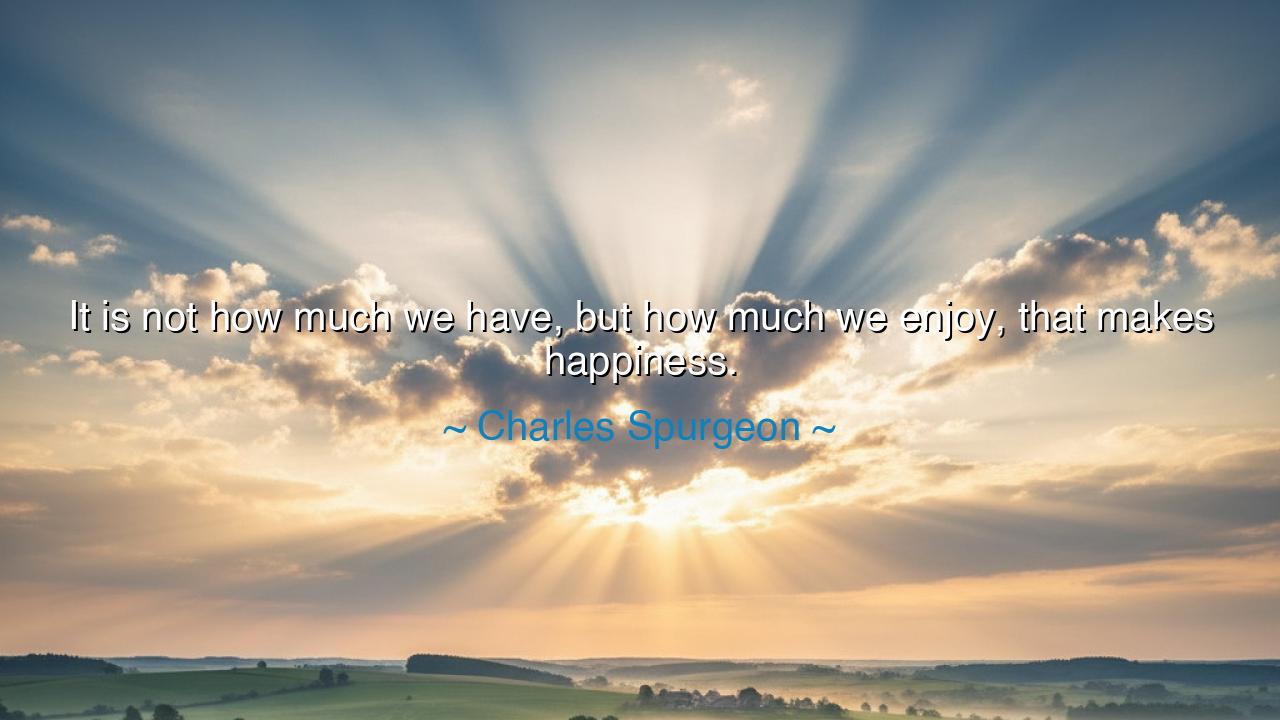
It is not how much we have, but how much we enjoy, that makes






The preacher Charles Spurgeon, known to many as “the Prince of Preachers,” once spoke a truth that rings through the ages: “It is not how much we have, but how much we enjoy, that makes happiness.” These words, though gentle in tone, carry the weight of eternal wisdom. They remind us that happiness does not spring from abundance, but from gratitude—that the heart’s measure of joy is not counted in coins or possessions, but in the spirit’s capacity to cherish what it already holds.
Spurgeon lived in the nineteenth century, a time of industry, invention, and rising wealth. Yet he saw clearly what so many still fail to see today: that no accumulation of riches can purchase contentment. In his ministry, he watched the wealthy and the poor alike come before God in search of peace. He saw that the one who possessed much often lived in fear of loss, while the one who possessed little but lived in thankfulness found peace beyond price. For joy, as Spurgeon taught, is not found in having, but in enjoying—in the art of seeing beauty in small things, in the stillness of the soul that knows enough is enough.
To say “It is not how much we have” is to challenge the restless hunger of mankind. The world teaches us to gather, to consume, to chase endlessly after more: more wealth, more comfort, more praise. But Spurgeon’s wisdom speaks as a lantern in that darkness. Happiness, he says, is not the fruit of “more,” but the bloom of “enough.” A man who can delight in his modest meal, his humble home, and his quiet blessings is richer than kings who live in discontent. The one who cannot enjoy what he has is like a beggar at a feast—surrounded by plenty, yet starving in spirit.
History itself bears witness to this truth. Consider Diogenes, the ancient philosopher who lived in a barrel with little more than a cloak and a cup. When Alexander the Great came to him and asked if there was anything he desired, Diogenes replied, “Yes—stand out of my sunlight.” In that moment, the mightiest ruler in the world stood before the freest man alive. For Alexander had conquered empires but not himself, while Diogenes, with nothing, had mastered the art of enjoyment. He needed little because he valued deeply. Thus, Spurgeon’s Christian wisdom and Diogenes’ ancient philosophy meet in harmony—both declaring that true happiness flows not from possession, but from peace within.
Yet let it not be thought that this joy comes from laziness or indifference. To enjoy is not to neglect effort, but to bring mindfulness to life’s labors—to see the divine in the ordinary, the sacred in the simple. It is to pause in the midst of toil and say, “This moment, too, is enough.” The grateful heart transforms the smallest pleasures into treasures: the laughter of a friend, the warmth of sunlight, the taste of bread, the sound of rain. When we cease to measure our lives by what we lack, and begin to measure them by what we love, we discover that happiness was never far away—it was only hidden by desire.
This is the wisdom Spurgeon sought to pass down: that gratitude is the root of joy, and contentment its flower. The miser who clutches his wealth lives in fear; the grateful man who shares his meal lives in abundance. When we learn to take pleasure in what is simple and true, we become free from the tyranny of “more.” We begin to see that life, in its essence, is already full—if only we have eyes to behold it.
So, my children, remember this: it is not how much you gather, but how deeply you appreciate that determines the quality of your days. Practice gratitude as the ancients practiced prayer—daily, deliberately, and with reverence. Look upon your life not as a ledger of what is missing, but as a garden of blessings waiting to be tended. When envy stirs, quiet it with thanksgiving; when desire burns, cool it with reflection. For the man who enjoys what he has possesses all that he needs, while the one who never finds contentment, even amid plenty, remains forever poor.
And thus, as Charles Spurgeon taught, happiness is not a prize bestowed upon the fortunate—it is a discipline of the soul. Seek it not in the vast, but in the near; not in the new, but in the now. Live with gratitude, savor your blessings, and your heart will know the peace that kings and conquerors have sought in vain. For when you learn to enjoy, you will discover that you have already enough—and in that sacred realization lies the truest happiness of all.






AAdministratorAdministrator
Welcome, honored guests. Please leave a comment, we will respond soon